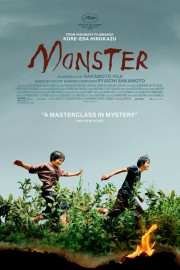Monster
One of the things that makes Kore-eda Hirokazu’s films so powerful to me are how they explore the complexities of real life seen from a variety of perspectives. My introduction to him was “Nobody Knows,” and it flattened me emotionally in a way few films this century have done. Of the films of his I’ve seen since,” “Monster” is the one that most closest replicated that impact. It’s also one of the few films that understands the importance of the multiple perspectives Akira Kurosawa showed us in “Rashomon,” and it builds from that in remarkable ways.
I’m not as familiar with the scores of Ryuichi Sakamoto as I should be, but when his name has popped up in the last decade, it’s given me a musical experience that is singularly compelling. “Monster” marks his final score, and his delicate compositions, built out of a handful of new works, get to the degrees of pain and humanity Kore-eda is putting onscreen. It is a haunting, lovely goodbye.
“Monster” is written by Yûji Sakamoto, and follows an escalating situation from three perspectives. In the first one, a single mother (Sakura Ando) is trying to get answers- and actions- when her son’s behavior changes drastically, and he makes some accusations against his teacher. In the second one, a teacher (Eita Nagayama) is frantically trying to understand a student’s actions- or inactions- in his class. In the third one, a young boy (Soya Kurokawa) is struggling to be a friend to a young girl in his class, and sometimes acting out in unexpected ways as a result. These are all the same story; The young boy is the son and student, and the teacher is the one trying to understand him. After following the mother’s perspective, it’s fascinating that we barely see her as part of the teacher or the boy’s stories; she is on the outside looking in, but so is the teacher, even though he is in the middle of the drama.
Point-of-view is important for how we process events in movies. For much of the movie, the mother doesn’t feel like she is overreacting; she also doesn’t seem to be willing to listen to criticism of her son, but we’ve seen what she’s seen of her son’s actions, and honestly, it’s hard not to imagine us in the same position she is. Even in the beginning, we feel as though the teacher is trying to do right in a difficult situation, but when we see what he sees, we understand why events were perceived in a particular way, and how the truth might not be an easy thing to put in the conversation of this story. That leaves the boy, and he is the one we empathize with the most out of three empathetic, flawed human beings. Since the death of his father, his mother has had to raise him by herself, and that cannot be an easy task. Clearly, he does not feel comfortable sharing his truth with her, which is something I remember being the case for a number of years with my own parents. The inner lives of children is something adults will always have a hard time dealing with, even when we realize that we, ourselves, were children. It’s entirely likely he is still trying to work through the feelings he is having by the end of a narrative that feels like has connected him strongly with some people, and distanced himself from others. Kore-eda doesn’t give us an easy roadmap to how his characters are feeling- and why- because he understands that feelings are fluid, and ever-changing. His best films challenge us to see the bleakness of life alongside its joys. “Monster” is a film that feels bleak, but ends on a note of joy for two characters who appear to need it most.










